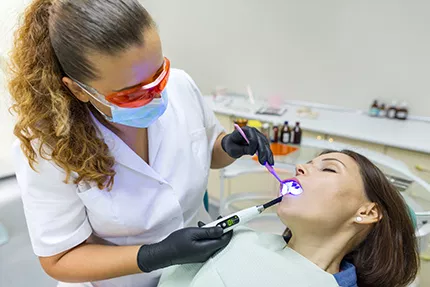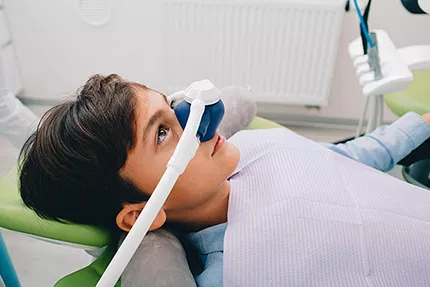Dental anxiety affects millions of people, preventing them from receiving the oral healthcare they need. Fear of pain, needles, or dental procedures can cause patients to delay or avoid treatment altogether, leading to more serious dental problems over time. Modern sedation dentistry offers safe and effective solutions to help patients feel comfortable and relaxed during their dental visits.
At Sonrisa Family Dental, we understand every patient has different comfort levels and anxiety concerns when it comes to dental care. Our sedation dentistry options help create a calm, stress-free environment where you can receive the treatment you need without fear or discomfort. We accept most insurance plans, including Medicaid and Medicare for orthodontics and oral surgery, ensuring comfortable dental care remains accessible to all members of our community. Our compassionate, bilingual team works with you to determine the best sedation option tailored to your specific needs and medical history.
Understanding Sedation Dentistry
Sedation dentistry uses medication to help patients relax during dental procedures. Unlike general anesthesia, most forms of dental sedation allow you to remain conscious and responsive while feeling deeply relaxed and comfortable. This approach makes dental treatment possible for patients who might otherwise avoid necessary care due to anxiety or fear.
Different levels of sedation are available depending on your anxiety level and the complexity of your procedure. Sedation can range from minimal relaxation to deeper levels that help you feel completely at ease throughout your treatment. Our experienced team carefully monitors your comfort and safety throughout the entire process.
Benefits of Sedation Dentistry
Sedation dentistry offers numerous advantages beyond simply reducing anxiety. Patients often experience little to no memory of their procedure, making future dental visits less intimidating. Time seems to pass quickly under sedation, allowing complex treatments to be completed in what feels like minutes rather than hours.
Types of Sedation Options
We offer several sedation methods to accommodate different patient needs and procedure requirements. Each option provides a different level of relaxation while maintaining your safety and comfort throughout treatment.
Nitrous Oxide (Laughing Gas)
Nitrous oxide represents one of the safest and most commonly used forms of dental sedation. According to the American Dental Association, nitrous oxide is a safe and effective sedative agent that is mixed with oxygen and inhaled through a small mask that fits over your nose to help you relax.
This colorless, odorless gas takes effect quickly and wears off rapidly once the mask is removed. You remain fully conscious and can respond to instructions while feeling relaxed and comfortable. Most patients can drive themselves home after nitrous oxide sedation since the effects disappear within minutes of removing the mask.
Oral Sedation
Oral sedation involves taking prescribed medication before your appointment to help you feel calm and drowsy. This option works well for patients with moderate anxiety or those undergoing longer procedures. The medication is taken about an hour before treatment, allowing time for the sedative effects to begin.
With oral sedation, you may feel sleepy but will remain conscious and able to respond to questions. Many patients have little memory of their procedure afterward. Since the effects can last several hours, you will need someone to drive you to and from your appointment.
IV Sedation
Intravenous sedation provides the deepest level of conscious sedation available in our office. Medication is delivered directly into your bloodstream through a small IV, allowing for precise control of sedation levels throughout your procedure. This option is ideal for complex treatments or patients with severe dental anxiety.
During IV sedation, you enter a deeply relaxed state while remaining technically conscious. Most patients have no memory of their treatment and feel as though they slept through the entire procedure. Our trained professionals continuously monitor your vital signs to ensure your safety and comfort.
Safety and Monitoring
Patient safety remains our top priority during all sedation procedures. Our team receives specialized training in sedation techniques and emergency protocols. We carefully review your medical history and current medications to ensure sedation is safe and appropriate for you.
Throughout your treatment, we continuously monitor your vital signs, including heart rate, blood pressure, and oxygen levels. Modern monitoring equipment allows us to track your condition and adjust sedation levels as needed. Emergency equipment and reversal medications are always available should they be needed.
Before your sedation appointment, we provide detailed pre-treatment instructions including dietary restrictions and medication guidelines. Following these instructions helps ensure your safety and the effectiveness of your sedation.
Contact Sonrisa Family Dental
Don’t let dental anxiety prevent you from achieving optimal oral health. Our sedation dentistry options help make dental care comfortable and stress-free, allowing you to receive the treatment you need in a relaxed environment. Our experienced team is committed to your safety and comfort throughout every step of your care.
Schedule a consultation today to discuss your sedation options and learn how we can help you overcome dental anxiety. Our convenient Chicago locations make it easy to access comfortable dental care close to home. Visit our contact form to book your appointment and take the first step toward anxiety-free dental care.
Frequently Asked Questions
What is sedation dentistry?
Sedation dentistry offers patients with general anxiety or fears about a dental procedure the opportunity to have a more comfortable and stress-free experience. By utilizing safe and controlled sedation techniques, the patient is eased into a state of complete relaxation before the procedure. This approach eliminates discomfort, pain, and preoperative anxiety, and typically makes patients feel more at ease post-operatively, as they have little or no memory of the actual moment-to-moment procedure.
What is the difference between local anesthesia and dental sedation?
Local anesthesia involves an injection directly into or close to the area where a procedure is being performed. While it eliminates any sensation of pain in the targeted area, it does not affect your state of mind or level of anxiety. When a patient receives sedation, additional medications to ease anxiety and promote relaxation are employed in advance of local anesthesia. In this way, both the stress and discomfort associated with a procedure are eliminated. Sedation can be administered in a variety of forms based upon patient needs and the recommendations of the dentist or dental anesthesiologist.
What are the different types of dental sedation?
Choosing the most appropriate method of sedation for a procedure depends on a variety of factors such as a patient’s medical history and their level of anxiety. Dental sedation can come in the form of nitrous oxide sedation, oral conscious sedation, and IV sedation. Certain patients receiving comprehensive treatment or undergoing a complex surgical procedure may require general anesthesia in a hospital setting.
Nitrous oxide, or “laughing gas,” is a mild sedative, which is inhaled through a small mask over the nose. A standard in dental sedation for decades, the effects of nitrous oxide are almost immediate and wear off quickly once your procedure is completed.
Oral sedation involves the prescription of an oral medication prior to your appointment. Taken at the recommended time before your visit, oral sedation allows you to feel fully relaxed by the time you’re ready for your procedure. With oral sedation, it’s necessary to plan on having an escort to and from your dentist’s office.
IV Sedation is administered intravenously, or directly into a vein. It is typically indicated when a deeper state of sedation is required. Your dentist will provide you with specific instructions before your visit, and require that you have an escort for the trip home from your appointment.

